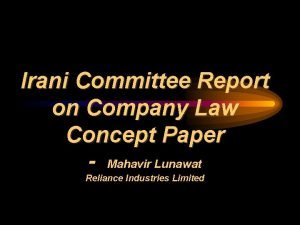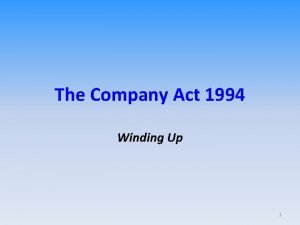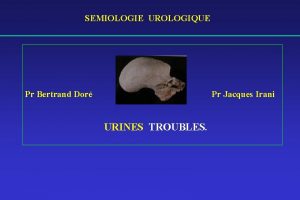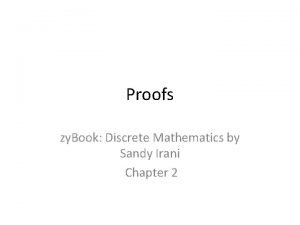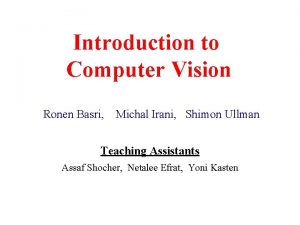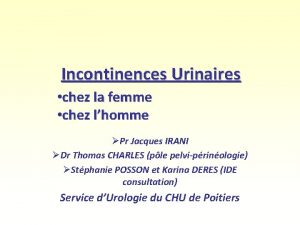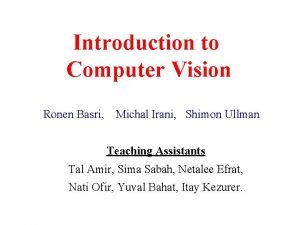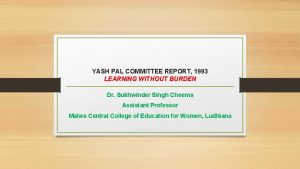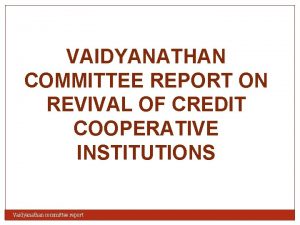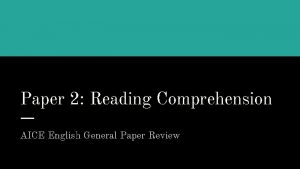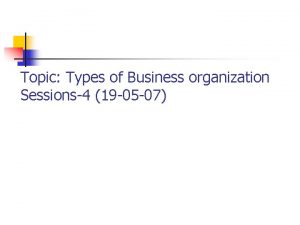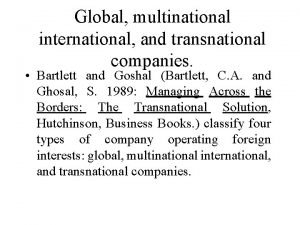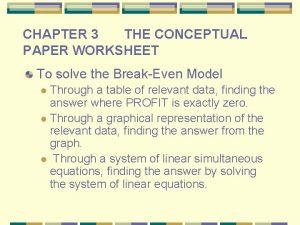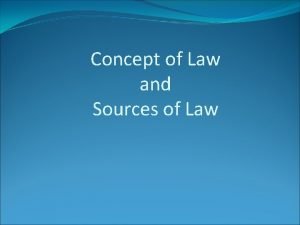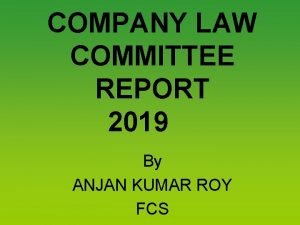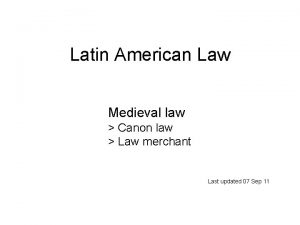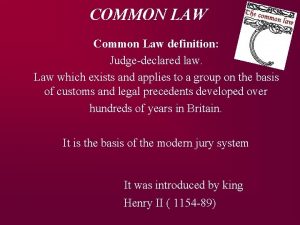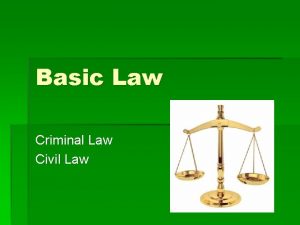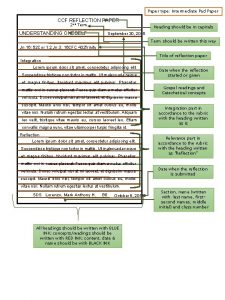Irani Committee Report on Company Law Concept Paper




![Concept Paper - Major Changes • No new step-down subsidiary [cl. 2(38)] • Definition Concept Paper - Major Changes • No new step-down subsidiary [cl. 2(38)] • Definition](https://slidetodoc.com/presentation_image/3e93c53269809c4e9f21997efa3b6336/image-5.jpg)

































- Slides: 38

Irani Committee Report on Company Law Concept Paper - Mahavir Lunawat Reliance Industries Limited

Historical Background • Companies Bill, 1997 + R. D. Joshi Committee Report • Accounting Scams in US • US Sarbanes Oxley Act, 2002 • Naresh Chandra Committee • Amendment Bill, 2003 • Concept Paper on Company Law • White Paper on Modern Company Law, UK • J. J. Irani Committee

Approach of the Concept Paper • To bring the Corporate Law in consonance with changes that have occurred in economic development • To delete redundant provisions and regroup the scattered provisions • To simplify and rationalise provisions of the Act • To delink procedural aspects from the substantive law

Concept Paper – A quick recap • Draft Bill not vetted by Law Ministry • 1956 Act + 2003 Amendment Bill • Notes on Chapters (in the form of overview) • 289 Sections in 25 Chapters • Penalties to be prescribed in separate schedule • provisions to be prescribed by way of Rules - more than 300 times
![Concept Paper Major Changes No new stepdown subsidiary cl 238 Definition Concept Paper - Major Changes • No new step-down subsidiary [cl. 2(38)] • Definition](https://slidetodoc.com/presentation_image/3e93c53269809c4e9f21997efa3b6336/image-5.jpg)
Concept Paper - Major Changes • No new step-down subsidiary [cl. 2(38)] • Definition of Independent Director, attributes as suggested by NCC to be prescribed [cl. 2(45)] • Definition of Promoter [cl. 2(67)] • Sections 108 A to 108 H to be removed • Share Warrants - Abolished

Major Changes contd. . . • General Meetings – Statutory Meeting - Abolished – No Gifts to members in GMs; discount coupon, food and beverages to be allowed – GMs on Public Holidays to be permitted – All business other than Ordinary Business (AMBP) shall be Special Business;

Major Changes contd. . . • Dividend – Dividend once declared cannot be modified/ rescinded – Interim Dividend - Subject to shareholders’ approval – Dividend out of reserves, in case of inadequacy / absence of profits - in terms of Rules AMBP + with following approvals: à Directors present at the meeting à FIs which have made term loans à Shareholders by way of Special Resolution • Consolidated Financial Statements in place of individual accounts of the company and subsidiaries

Major Changes contd. . . • Audit – Non-audit Services AMBP - to be prohibited – Special Audit - to be made more exhaustive – Cost Auditor - to be appointed by general body; CG approval will not be required. – Additional disqualifications based on NCC recommendations

Major Changes contd. . . • Audit Committee – Composition - not less than 2 independent directors; max no. AMBP; existing cos to reconstitute within 1 year – Disclosure of composition in Directors’ Report • Directors

Major Changes contd. . . • Directors – Alternate Director - only if original director out of India • Board Meetings – Maximum gap - 3 months – Meetings by Videoconferencing – emergency meeting without notice, but majority of independent directors have to attend.

Major Changes contd. . . • Related Party Transactions – Covered exhaustively – Provisions of 295, 297, 314 etc. are proposed to be brought under one umbrella by consolidating arrangements re. services, loans, leasing of all properties, underwriting, appointment of agents, appointment of place of profit etc. – Prior consent of Board; CG approval in respect of cos having prescribed paid up share capital or entering into transactions of prescribed value. • Appointment of Company Secy - No escape route; Secretarial Compliance Audit - more exhaustive; Precertification of documents • Appointment of Chief Accounts Officer - Mandatory

Irani Committee – Terms • Issues arising from the revision of the Companies Act, 1956 • Responses received from various stakeholders on the Concept Paper. • Bringing about compactness by reducing the size of the Act • Enabling easy and unambiguous interpretation by recasting the provisions of the Law. • Providing greater flexibility in rule making to enable timely response to ever-evolving business models. • Protecting the interests of stakeholders and investors, including small investors.

DR. J J Irani Committee Report – Recommended Scheme of Legislation

Recommended Scheme of Legislation

Dr. J J Irani Committee – Major Changes Recommended

Classification & Registration of Companies (Chapter III) • ‘One Person Company’ concept, as prevalent in countries like UK, to be introduced. • Government companies not in strategic fields like security of State, to be at par with other companies. • Elaborate regime of governance and disclosures for holdingsubsidiary companies without any restrictions on number of subsidiaries • E-governance • No limitation on number of partners, Provisions of section 11 of the existing Act to be removed. • No Requirement of Commencement Certificate. • Simplified exit regime without aid of special exit scheme

Management & Governance (Chapter IV) • No limit to maximum number of Directors • No State intervention in appointment, removal, remuneration of directors. • Companies to have at least one resident director. • Minimum of 1/3 rd of the total directors as independent director to be adequate irrespective of whether the chairman is executive or non-executive. • Nominee directors not to be deemed independent. • Principles of independent directors, their attributes, role, qualifications, liability etc. to be covered under the Act itself. • Basic duties of directors to be spelt out in the Act itself.

Management & Governance (Chapter IV) • The number of alternate directorships a person holds to fall within the overall limit of directorships (to be limited to 15) • Managerial remuneration to be without any upper limits. Provisions of the existing Sections 349, 350 should be removed from the statute book. Similarly, no limits to be prescribed for sitting fee. • Directors’ remuneration from subsidiary to be allowed. • Directors’ Remuneration Report, as prevalent in UK, to be provided as a part of Directors’ Report. • Manner and composition of Audit Committee, Stakeholders Relationship Committee & Remuneration Committee to be specified under law.

Management & Governance (Chapter IV) • Failure to attend board meetings for a period of 1 year to be made a ground for vacation of office regardless of whether or not leave of absence granted. • Specific provisions to be made in law to regulate the process of resignation by a director. • Resignation of director to be effective from the date of resignation; remaining director(s) may co-opt additional director(s) to maintain minimum number of directors. In the event of all directors vacating office, promoters to hold office of directors till the next AGM wherein new directors should be appointed.

Management & Governance (Chapter IV) • Composition of the Board of companies seeking public subscription, to be kept intact for 2 years or till the procured funds are utilised. • Notice Period of 7 days for Board meetings with the provision for emergency meetings. • Board meetings through video-conferencing / teleconferencing Special Resolution to be required for certain items such as mentioned under Section 293(1)(a), (c) and (d) of the present Act. Shareholders’ approval to be required for sale of 20% or more of the total assets of the company.

Management & Governance (Chapter IV) • Sale / transfer of investment in equity of other bodies corporate constituting 20% or more of the total assets of the investing company, to require special resolution. • Provisions as contained in the existing Section 201 to be modified to have the enabling provision for providing Directors and Officers (D&O) Insurance. • Mandatory appointment of key managerial personnel, CEO / MD, CFO and Company Secretary. • AGM may be held at a place (in India) other than the place of RO, provided at least 10% members in no. reside at such place. • Threshold limits under various Sections like 257, 269 etc. to be enhanced.

Related Party Transactions (Chapter V) • Strengthened disclosure regime for related party transactions with coverage in Directors’ Responsibility Statement. Transactions beyond threshold to require shareholders’ approval. • Loans to directors and holding of office or place of profit to be approved by shareholders.

Minority Interest (Chapter VI) • Concepts of ‘minority’ and ‘minority interest’ to be recognised under law. Law must balance the need for effective decision making on corporate matters through consensus without permitting persons in control to stifle action for redressal arising out of their own wrong doings. • Class action/derivative action to be recognised in law.

Investor Education & Protection (Chapter VII) • Credit rating need not be mandated except for companies seeking deposits. • An effective investors’ grievance redressal mechanism by way of recourse to consumer courts and capital markets ombudsman to be provided for safeguarding investor interest. • Right of investors in respect of unclaimed dividends etc to be recognised even after 7 years.

Access to Capital (Chapter VIII) • Tracking and Treasury Stocks and perpetual preference shares to be recognised. • DRR in case of NBFCs to be recognised by RBI.

Accounts and Audit (Chapter IX) • Consolidation of accounts in addition to the stand-alone accounts of the holding company; requirements of existing Section 212 to be dispensed with. • Financial statements of overseas subsidiaries to be accepted in the same format and currency in which these were prepared as per laws of the relevant country. • Books of account and records to be preserved for 7 years as required under the Tax Law. • Responsibility of maintenance of records of non-corporate entities owned by a company to be of that company.

Accounts and Audit (Chapter IX) • Cash Flow Statement to be made mandatory under the Company Law. • First Financial Year to end on March 31 every year provided it is not less than 3 months; subsequent Financial Year to end on March 31 every year. • Financial statements to be signed by MD/CEO/CFO/Company Secretary even if they are not present in the Board meeting which approved the financial statements. All directors present in the meeting to sign the financial statements. Dissenting director to also sign, with the dissent note.

Accounts and Audit (Chapter IX) • The Companies (Transfer of Profits to Reserves) Rules, 1975 and the Companies (Declaration of Dividend out of Reserves) Rules, 1975 to be dispensed with. • Rendering of the prescribed non-audit services by the statutory auditor to be prohibited; other non-audit services may be provided with the prior approval of the audit committee. • Government approval for appointment of cost auditor to be dispensed with. • Special audit to be dispensed with.

Mergers & Acquisitions (Chapter X) • Mandatory valuation of shares by independent valuers appointed by audit committee; Valuation Standards to be developed on lines of International Valuation Standards. • Concept of electronic registry to be evolved. • Specific provisions in respect of merger of listed company into an unlisted company and vice versa. • Approval of scheme of merger by 3/4 th in value of shareholders/creditors only. • Short form of amalgamation for associate companies / private companies to be provided. • Contractual mergers & cross border mergers to be recognised. • Committee of Independent Directors to monitor adequacy of disclosures.

Investigation (Chapter XI) • Random scrutiny of filings of documents rather than inspection of companies through the enforcement machinery. • Private professionals may be appointed as inspector to carry out investigation. • Serious Fraud Investigation Office (SFIO) to be strengthened by passing a separate legislation therefor. • Central Government may refer complex cases involving substantial public interest or multi-disciplinary ramifications to SFIO

Offences & Penalties (Chapter XII) • Regime of penalties commensurate with offences. • Liability of the Board to be clear and absolute. • Clear penalties regime for officers-in-default and professionals. • In house structure of levying monetary penalties where power to impose fine may be vested with ROC. • Convictions for criminal breaches of the Act by company & officers to be disclosed in Annual Report. • Limitation period to be specified for commencement of penalty proceedings under the Companies Act. • Provisions for revision and rectification of mistakes. • Whistle blowers to be protected.

Restructuring and Liquidation (Chapter XIII) • Concept of ‘sick industrial company’ to be replaced by ‘insolvent company’ and accordingly, sickness test on the basis of erosion of net worth to be replaced by liquidity test. • CA/CS/CWA/law professionals to be recognised as insolvency practitioners. • Rehabilitation Cess to be replaced by ‘Insolvency fund’ with optional contribution by companies. • A suitable framework for cross border insolvency may be put in place by adopting UNCITRAL Model Law on cross border insolvency with suitable modifications.

Dr. J J Irani Committee – Issues

Certain Issues • Resignation – Effective from the date of resignation subject to filing within the prescribed period • Conflict with Clause 49 • Remuneration Report v. Report on Corporate Governance • Right of Inspection of records by directors – should not be absolute • Maintenance of records of non-corporate entities owned by a company – Harsh • Professionals guilty unless specifically advised against violations • Credit rating requirements – conflicting views with reference to SEBI DIP Guidelines

Certain Unattended Areas • Single Incorporation Document • No Authorised Capital • Removal of Sections 108 A – 108 H of the Existing Companies Act • Non-Rotational Directors • Targeted Buy Back of Odd-Lot Shares • Resignation by All Directors of a Company having No Identified Promoter(s) • Advance Rulings • Check on misuse of Investor rights

New Company Law - Way Forward

Way Forward • Harmonisation between Company law and other laws including Listing Agreement. • Governance aspects to be approached within a pragmatic framework. • The Law should be clear and unambiguous. • Comprehensive Law with substantive provisions in the Act itself. • Advance Rulings Mechanism as provided under Tax Law may also be considered to be brought into the Company Law. • Effective implementation without undue harassment for corporates should be ensured. Law should be facilitating rather than restrictive and should not put any undue speedbreakers to corporate functioning.

Thank You !
 J.j. irani committee report
J.j. irani committee report Company act 1994
Company act 1994 Newton's first law and second law and third law
Newton's first law and second law and third law Newton's first law and second law and third law
Newton's first law and second law and third law V=k/p
V=k/p Constant in avogadro's law
Constant in avogadro's law Sandy irani
Sandy irani Irani brothers ghana
Irani brothers ghana Jacques irani
Jacques irani Sandy irani discrete mathematics
Sandy irani discrete mathematics Atopy
Atopy Iráni felföld éghajlata
Iráni felföld éghajlata Michal irani
Michal irani Jacques irani
Jacques irani Michal irani
Michal irani Discrete mathematics sandy irani pdf
Discrete mathematics sandy irani pdf Education without burden
Education without burden Vaidyanathan committee report relates to revival of
Vaidyanathan committee report relates to revival of Cadbury committee report ppt
Cadbury committee report ppt English general paper paper 2 comprehension
English general paper paper 2 comprehension Aice writing
Aice writing A sports company was ordered to prepare 100 paper cylinders
A sports company was ordered to prepare 100 paper cylinders Partnership vs limited company
Partnership vs limited company Subsidiary company meaning
Subsidiary company meaning Multinational vs transnational corporations
Multinational vs transnational corporations What type of company was the virginia company
What type of company was the virginia company Paper airplane lab report
Paper airplane lab report A concept paper
A concept paper What is the importance of concept paper
What is the importance of concept paper How to make a concept paper
How to make a concept paper Concept document game design
Concept document game design Concept paper worksheet
Concept paper worksheet Concept paper structure
Concept paper structure Research paper format
Research paper format Concept notes example
Concept notes example Concept paper example
Concept paper example Concept paper
Concept paper Internal control and internal check
Internal control and internal check Hedgehog concept company examples
Hedgehog concept company examples
